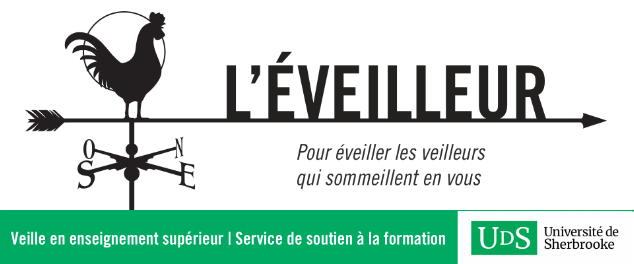Un récent sondage de la firme McGraw-Hill, effectué auprès de 1 700 étudiants des universités aux États-Unis, fait état de la croissance rapide de l’utilisation des appareils mobiles chez ces derniers:
- 81% des étudiants utiliseraient des téléphones intelligents ou des tablettes pour étudier, une hausse de 40% en une seule année (2013-2014);
- 85% des étudiants sondés affirment que leurs résultats se sont améliorés de façon modérée ou importante suite à l’utilisation de technologies adaptées aux mobiles;
- 65% indiquent que les technologies permettent de se préparer davantage pour compléter les activités proposés par l’enseignant en classe;
- 48% y voit des gains de temps.
Selon Sharon Loeb, vice-présidente du marketing chez McGraw-Hill, les étudiants étudient de plus en plus lors de leurs déplacements, en de courtes séquences au moment qui leur convient. L’offre institutionnelle doit s’adapter à cette nouvelle réalité en offrant davantage d’expériences personnalisées, exploitant les possibilités des technologies mobiles pour mieux accompagner les étudiants dans leurs cheminements individuels, où qu’ils se trouvent:
“The rise of studying via mobile isn’t simply due to the ubiquity of smartphones and tablets on campus, it’s a case of mobile suiting the way students study now. The feedback we’ve received from students and instructors suggests that today’s students tend toward shorter, more concentrated bursts of studying anywhere they’re able, rather than waiting for several hours to hunker down in the library,” said Sharon Loeb, vice president of marketing for McGraw-Hill Education, Higher Ed. “We expect the growth in mobile use among college students to continue for the next five years, which means institutions will need to adapt their infrastructure and faculty will want to consider ways to incorporate mobile learning into their courses.”
La qualité et l’efficacité de la formation sont également associées à la mise en place de solutions facilitant une expérience éducative personnalisée:
“Greater personalization and effectiveness are why we see major growth in adaptive learning technologies,” said Loeb. “Adaptive technology delivers personalized learning experiences that continually respond to students’ individual knowledge and skill levels, helping them to focus on areas where they need the most help and resist the urge to spend time on material they’ve already mastered. Our adaptive systems have been shown to improve student performance by an average of one letter grade, and it’s exciting to see this effectiveness translate to increasing popularity among students.”
Sources:
- Rapid Growth in Mobile Device Usage by College Students. Tech & Learning, 29 avril 2015.
- Report: New McGraw-Hill Education Research Finds More than 80 Percent of Students Use Mobile Technology to Study. McGraw-Hill Education, 9 mars 2015.






